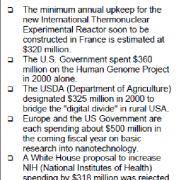Seedy Squabble in Switzerland
Submitted by ETC Staff on
What 'grows' but doesn't 'move'? If you're an agronomist, the standard answer is a 'plant'. In Neuchatel, Switzerland last week however, at a tactically critical food security negotiation, the running joke was 'Washington trade policy'. As world seed and biotech industries, governments of Europe and Japan, and G77 (developing) countries watched in consternation, U.S. Government representatives tied themselves in knots trying to explain the difference to uninterested patent and trade lawyers back in their capitol, between plant genetic resources in agriculture from other industrial technologies. The U.S. delegation continuously raised what appeared to other delegations, to be nonsensical conflicts between the World Trade Organization (WTO) and an agreement being revised by governments in the UN Food and Agriculture Organization (FAO) to safeguard the flow of crop germplasm for scientific research and international food security.
Seedy Solutions in Switzerland?
Submitted by ETC Staff on
The Biosafety protocol on GM crops was a big thing in January, but the meeting about to begin in Neuchatel addresses a 'clear and present danger' to world food security. A brave little band of 'biocrats' could decide the fate of the scientific exchange of crop genetics. Their political bosses don't even know they've left town!
The Biosafety deal struck by governments in Montreal in January was intended to make the world safe from (or for?) transgenic crops. But what about the safety of those pedestrian seeds that are the basis for virtually all genetic crop improvement? The stuff that lets bio-engineers juggle genes and allows farmers to breed new diversity that can meet the stresses coming with global warming? Whereas the biosafety protocol tries to prevent the unwanted movement of GM seeds around the world, another treaty is being developed to facilitate the exchange of seeds for scientific research.
As Washington tries to sort out what a 'plant' is, world food security is iced in Switzerland. Industry, Europe, Japan, and the G77 (developing) countries look on in amazement.
Submitted by ETC Staff on
The Biosafety protocol on GM crops was a big thing in January, but the meeting about to begin in Neuchatel addresses a "clear and present danger" to world food security. A brave little band of "biocrats" could decide the fate of the scientific exchange of crop genetics. Their political bosses don’t even
Update on Trojan Trade Reps, Golden Rice, and the Search for Higher Ground
Submitted by ETC Staff on
The Golden Rice AstraZeneca saga is a case study in public science's failure to understand and address patent issues. In justifying their surrender of Vitamin A enriched GM rice to the giant corporation, the researchers claim they couldn't navigate the 70+ intellectual and tangible property conflicts that could potentially scuttle their work. There are likely no more than 11 - and possibly as few as 4, patent conflicts and one outstanding tangible property issue. A public sector group - including the people Golden Rice is intended to help - should meet to debate all the options and alternatives. The contract and the events surrounding it should be investigated.
The Mouse that Roared on Animal Pharm
Submitted by ETC Staff on
In a split 2-1 decision, the Canadian Federal Court of Appeal ruled in favour of granting a patent to Harvard Medical School for the oncomouse, a mouse genetically engineered to carry a cancer-causing gene. The decision marks another point in the 15-year battle in the Canadian courts over whether Mother Nature or a Harvard scientist invented the mouse and its offspring.

